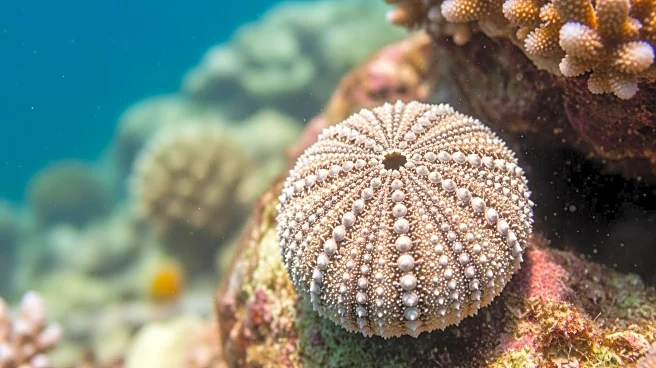What's Happening?
An international team of researchers has discovered that sea urchins possess a complex central nervous system that functions like an 'all-body brain.' This finding challenges the traditional understanding
of nervous system evolution, as sea urchins lack a conventional central nervous system but exhibit a genetic organization similar to vertebrate brains. The study, led by biologist Jack Ullrich-Lüter from the Natural History Museum in Berlin, mapped the cell types in young purple sea urchins, revealing a diverse array of neuronal cells expressing both echinoderm-specific and ancient genes found in vertebrates. The research also uncovered light-sensitive cells across the sea urchins' bodies, suggesting a sophisticated ability to detect and process light, akin to structures in the human retina.
Why It's Important?
This discovery has significant implications for understanding the evolution of complex nervous systems. It suggests that animals without a traditional central nervous system can develop brain-like structures, potentially altering the scientific perspective on how nervous systems evolved across different species. The findings could lead to new insights into the genetic and cellular mechanisms that enable such complex systems to develop, impacting fields like evolutionary biology and neuroscience. Additionally, the revelation of light-sensitive cells throughout the sea urchins' bodies may prompt further research into sensory processing in non-vertebrate species, potentially influencing studies on sensory biology and adaptation.
What's Next?
Future research may focus on exploring the genetic pathways and cellular processes that allow sea urchins to develop their unique nervous system. Scientists might investigate how these findings can be applied to other echinoderms or even broader animal groups, potentially leading to breakthroughs in understanding nervous system diversity and evolution. The study could also inspire new approaches in bioengineering and synthetic biology, leveraging the sea urchins' nervous system characteristics for innovative applications.
Beyond the Headlines
The discovery raises ethical and philosophical questions about the definition of intelligence and consciousness in non-vertebrate species. It challenges the notion that complex nervous systems are exclusive to animals with centralized brains, prompting a reevaluation of how intelligence and sensory processing are understood across the animal kingdom. This could lead to broader discussions on the rights and treatment of invertebrates in scientific research and conservation efforts.









